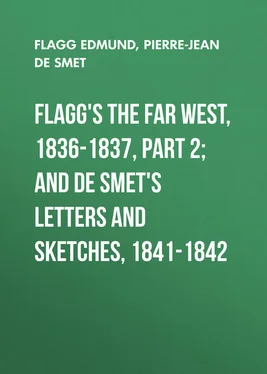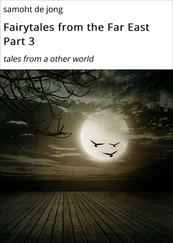Edmund Flagg - Flagg's The Far West, 1836-1837, part 2; and De Smet's Letters and Sketches, 1841-1842
Здесь есть возможность читать онлайн «Edmund Flagg - Flagg's The Far West, 1836-1837, part 2; and De Smet's Letters and Sketches, 1841-1842» — ознакомительный отрывок электронной книги совершенно бесплатно, а после прочтения отрывка купить полную версию. В некоторых случаях можно слушать аудио, скачать через торрент в формате fb2 и присутствует краткое содержание. Издательство: Иностранный паблик, Жанр: foreign_antique, foreign_prose, на английском языке. Описание произведения, (предисловие) а так же отзывы посетителей доступны на портале библиотеки ЛибКат.
- Название:Flagg's The Far West, 1836-1837, part 2; and De Smet's Letters and Sketches, 1841-1842
- Автор:
- Издательство:Иностранный паблик
- Жанр:
- Год:неизвестен
- ISBN:нет данных
- Рейтинг книги:4 / 5. Голосов: 1
-
Избранное:Добавить в избранное
- Отзывы:
-
Ваша оценка:
- 80
- 1
- 2
- 3
- 4
- 5
Flagg's The Far West, 1836-1837, part 2; and De Smet's Letters and Sketches, 1841-1842: краткое содержание, описание и аннотация
Предлагаем к чтению аннотацию, описание, краткое содержание или предисловие (зависит от того, что написал сам автор книги «Flagg's The Far West, 1836-1837, part 2; and De Smet's Letters and Sketches, 1841-1842»). Если вы не нашли необходимую информацию о книге — напишите в комментариях, мы постараемся отыскать её.
Flagg's The Far West, 1836-1837, part 2; and De Smet's Letters and Sketches, 1841-1842 — читать онлайн ознакомительный отрывок
Ниже представлен текст книги, разбитый по страницам. Система сохранения места последней прочитанной страницы, позволяет с удобством читать онлайн бесплатно книгу «Flagg's The Far West, 1836-1837, part 2; and De Smet's Letters and Sketches, 1841-1842», без необходимости каждый раз заново искать на чём Вы остановились. Поставьте закладку, и сможете в любой момент перейти на страницу, на которой закончили чтение.
Интервал:
Закладка:
Edmund Flagg
Flagg's The Far West, 1836-1837, part 2; and De Smet's Letters and Sketches, 1841-1842
THE FAR WEST
[PART II]
XXXIII 1 1 Volume xxvii of our series begins with chapter xxxiii of the original New York edition (1838) of Flagg's The Far West . The author is here describing the part of his journey made in the late summer or early autumn of 1836. – Ed.
"Stranger, if thou hast learn'd a truth which needs
Experience more than reason, that the world
Is full of guilt and misery, and hast known
Enough of all its sorrows, crimes, and cares
To tire thee of it; enter this wild wood,
And view the haunts of Nature."
The moon had gone down; the last star had burned out in the firmament; and that deep darkness which precedes the dawn was brooding over the earth as the traveller turned away from the little inn at the village of Pinkneyville. Fortunately he had, the previous evening, while surveying the face of the region from the door of the hostelrie, gained some general idea of the route to Kaskaskia; and now, dropping the reins upon his horse's neck, he began floundering along through a blackness of darkness perfectly Cimmerian. It was, indeed, a gloomy night. The early mists were rising, damp and chill, from the soil saturated with the showers of the preceding day; and the darkness had become of a density almost palpable to the sense. Crossing a narrow arm of the prairie in the direction presumed to be correct, my horse carried me into a dense wood, and, if possible, the darkness increased. I had penetrated some miles into the heart of the forest, and was advancing slowly upon my way, when my attention was suddenly arrested by a low, whispering, rustling sound in the depths of the wood at my right; this gradually increasing, was almost immediately succeeded by a crashing, thundering, rushing report, till every echo far and wide in that dark old wood was wakened, and the whole forest for miles around resounded with the roar. My horse, terrified at the noise, leaped and plunged like a mad creature. An enormous forest-tree had fallen within a dozen rods of the spot on which I stood. As I left the noble ruin and resumed my lonely way, my mind brooded over the event, and I thought I could perceive in the occurrence a powerful feature of the sublime. The fall of an aged tree in the noiseless lapse of time is ever an event not unworthy of notice; but, at a moment like this, it was surely so in an eminent degree. Ages since – long ere the first white man had pressed the soil of this Western world, and while the untamed denizens of the wilderness roamed in the freedom of primitive creation – ages since had seen the germe of that mighty tree lifting up its young, green leaf from the sod, beneath the genial warmth of the sunlight and the summer wind. An age passed away. The tender stem had reared itself into a gigantic pillar, and proudly tossed its green head amid the upper skies: that young leaf, expanded and developed, had spread itself abroad, until, at length, the beasts of the earth had sought out its shade, and the tree stood up the monarch of the forest. Another age is gone, and the hoary moss of time is flaunting to the winds from its venerable branches. Long ago the thunderbolt had consecrated its lofty top with the baptismal of fire, and, sere and rifted, the storm-cloud now sings through its naked limbs. Like an aged man, its head is bleached with years, while the strength and verdure of ripened maturity yet girdle its trunk. But the worm is at the root: rottenness at the heart is doing its work. Its day and its hour are appointed, and their bounds it may not pass. That hour, that moment is come! and in the deep, pulseless stillness of the night-time, when slumber falleth upon man and Nature pauses in her working, the offspring of centuries is laid low, and bows himself along the earth. Yet another age is gone; but the traveller comes not to muse over the relics of the once-glorious ruin. Long ago has each been mouldering away, and their dust has mingled with the common mother of us all. Ah! there is a moral in the falling of an aged tree!
I was dwelling with rather melancholy reflections upon this casual occurrence, when a quick panting close at my side attracted my attention; a large, gaunt-looking prairie-wolf had just turned on his heel and was trotting off into the shade. The gray dawn had now begun to flicker along the sky, and, crossing a beautiful prairie and grove, I found myself at the pleasant farmhouse of a settler of some twenty or thirty years' standing; and dismounting, after a ride of eighteen miles, I partook, with little reluctance or ceremony, of an early breakfast. Thus much for the night adventures of a traveller in the woods and wilds of Illinois! My host, the old gentleman to whom I have referred, very sagely mistook his guest for a physician, owing to a peculiarly convenient structure of those indispensables ycleped saddle-bags; and was just about consulting his fancied man of medicines respecting the ailings of his "woman," who was reclining on a bed, when, to his admiration, he was undeceived.
Passing through an inconsiderable village on the north side of the Little Vermillion called Georgetown, my route lay through an extended range of hills and barrens . 2 2 The Vermilion River (which Flagg incorrectly wrote Little Vermilion) rises, with several branches, in the western and southern portions of La Salle County, and flows north and west, entering Illinois River at Rock Island, in Livingston County.
Among the former were some most intolerably tedious, especially to a horseman beneath a broiling sun, who had passed a sleepless night: but the sweep of scenery from their summits was beautiful and extensive. At length the traveller stood upon the "heights of Chester," and the broad Mississippi was rolling on its turbid floods a hundred yards beneath. The view is here a noble one, not unlike that from the Alton or Grafton bluffs at the other extremity of the "American Bottom," though less extensive. Directly at the feet of the spectator, scattered along a low, narrow interval, lies the village of Chester. Upon the opposite bank the forest rolls away to the horizon in unbroken magnificence, excepting that here and there along the bottom the hand of cultivation is betrayed by the dark luxuriance of waving maize-fields. A beautiful island, with lofty trees and green smiling meadows, stretches itself along in the middle of the stream before the town, adding not a little to the picturesqueness of the scene, and, in all probability, destined to add something more to the future importance of the place. To the right, at a short distance, come in the soft-flowing waters of the Kaskaskia through deeply-wooded banks; and nearly in the same direction winds away the mirror-surface of the Mississippi for twenty miles, to accomplish a direct passage of but four, an occurrence by no means unusual in its course. As I stood gazing upon the scene, a steamer appeared sweeping around the bend, and, puffing lazily along with the current past the town, soon disappeared in the distance. From the heights an exceedingly precipitous pathway leads down to the village. Chester is one of the new places of Illinois, and, of course, can boast but little to interest the stranger apart from the highly scenic beauty of its situation. 3 3 Chester is on the Mississippi River, in Randolph County, just below the mouth of Kaskaskia River. In the summer of 1829, Samuel Smith built the first house there, and two years later he, together with Mather, Lamb and Company, platted the town site. It was named by Jane Smith from her native town, Chester, England, and was made the seat of justice for Randolph in 1848. – Ed. Steelesville (formerly Georgetown) is about fifteen miles east of Kaskaskia, on the road between Pinkneyville and Chester; the site was settled on by George Steele in 1810. A block-house fort erected there in 1812 protected the settlers against attacks from the Kickapoo Indians. In 1825 a tread-mill was built, and two years later a store and post-office were erected. The latter was named Steele's Mills. The settlement was originally called Georgetown and later changed by an act of state legislature to Steelesville, being surveyed in 1832. – Ed.
It has been mostly erected within the few years past; and, for its extent, is a flourishing business place. Its landing is excellent, location healthy, adjacent region fertile, and, for aught I know to the contrary, may, in course of years, rival even the far-famed Alton. Its landing, I was informed, is the only one for many miles upon the river, above or below, suitable for a place of extensive commerce.
Интервал:
Закладка:
Похожие книги на «Flagg's The Far West, 1836-1837, part 2; and De Smet's Letters and Sketches, 1841-1842»
Представляем Вашему вниманию похожие книги на «Flagg's The Far West, 1836-1837, part 2; and De Smet's Letters and Sketches, 1841-1842» списком для выбора. Мы отобрали схожую по названию и смыслу литературу в надежде предоставить читателям больше вариантов отыскать новые, интересные, ещё непрочитанные произведения.
Обсуждение, отзывы о книге «Flagg's The Far West, 1836-1837, part 2; and De Smet's Letters and Sketches, 1841-1842» и просто собственные мнения читателей. Оставьте ваши комментарии, напишите, что Вы думаете о произведении, его смысле или главных героях. Укажите что конкретно понравилось, а что нет, и почему Вы так считаете.












